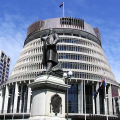
Last week, a group of ‘contrarian’ academics led by epidemiologist Simon Thornley broke ranks to propose an alternative strategy for dealing with COVID-19. ‘Plan B’ would see New Zealand abandon the goal of elimination to focus on mitigation. In practice this means easing restrictions and a return to ‘business as usual’. Underlying the contrarian argument is a belief that elimination would have disastrous social and economic consequences. Yes, we may ‘defeat’ COVID-19. But the result would be a broken and impoverished nation.
If Thornley and his collaborators expected a groundswell of support, they must have been disappointed. ‘Plan B’ was roundly condemned by the scientific community and social media. Thornley in particular has been ridiculed for ‘cherry-picking’ evidence. But most damning for Thornley was an earlier suggestion that New Zealand should consider following Sweden’s laissez faire approach to COVID-19. At the time of writing more than a thousand Swedes have died with the virus.
So it is unsurprising that a host of data scientists, medical researchers, political activists and commentators are urging the Government not to abandon its elimination strategy. At first it was demanded that the contrarian detractors release modelling and peer-reviewed research to ‘prove’ their argument. But at least one eliminationist grasped very quickly that the debate was less about science and more a question of moral and political philosophy.
Dr Siouxsie Wiles told Newsroom bluntly: “I’m just opposed to the very fundamental values base that they’re coming from, around how it’s okay to let people die of this because they would die anyway, or something?” For Wiles the difference between her and Thornley is the relative weight they place on ‘excess mortality’. That is to say, the number of deaths that COVID-19 may cause in excess of the overall mortality rate. On average 33,000 New Zealanders die per year. Is that figure likely to be much higher in 2020; and if so, how many of these ‘excess’ deaths will be from COVID-19? The international evidence is unclear.
But Wiles does not consider these questions relevant to the policy choice. In her view, society has a moral duty to eliminate the virus, regardless of any cost-benefit analysis. Saving lives from COVID-19 is her number one priority. Of course, to reduce people to mere numbers would be callous. But as the contrarian economist Ananish Chaudhuri has argued, should one not give equal weight to all lives that may be affected by such policy choices? Leaving aside the empirical data on mortality, this dilemma cannot be resolved by sophisticated mathematical models.
Science may give us the facts but it does not tell us what to do with them. One is more inclined to read a tract of political philosophy than a paper on epidemiology. In a way, the pandemic has exposed the flaws and contradictions in New Zealand’s predominantly liberal outlook. Isaiah Berlin, one of the 20th century’s greatest thinkers, devoted his life to understanding the different strands of liberalism and the conflict these entail. His own philosophy may be instructive to us during these bleak times.
At the core of Berlin’s thought is the simple notion that human beings yearn for many things: freedom, security, justice, equality and so on. Such values are universal and to some degree they are all essential to ‘the good life’. But very often these values conflict with one another. For Berlin, the greatest lesson of history is that the many different ends we strive for cannot be reconciled permanently. Each generation will face conflicts that have no ideal solution. Sometimes it may be necessary to give up freedom for security and vice versa. As Berlin put it, “We are doomed to choose and every choice may entail irreparable loss.”
But the idea that we can perfect the human condition has entranced people for centuries. It has motivated extreme political ideologies of left and right, inspiring revolutions, war and terrorism. Berlin was not exaggerating when he lamented that more human beings had given their lives for the ‘perfection’ of humanity than any other cause. Although scientific knowledge and technology continue to grow rapidly, the basic dilemma of how to balance different values and goals will endure. COVID-19 has exposed this fundamental truth.
A perfect solution exists only in the imagination. To pursue it would be futile and dangerous. The ideas needed most right now are humility and realism.
